REGIONAL SPOTLIGHT NORTHERN IRELAND
Page 40
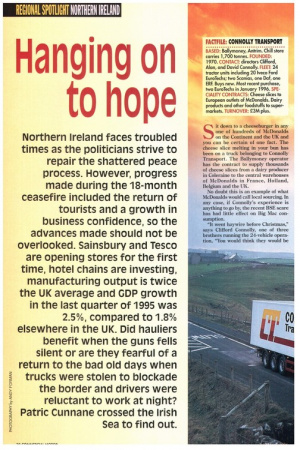
Page 41
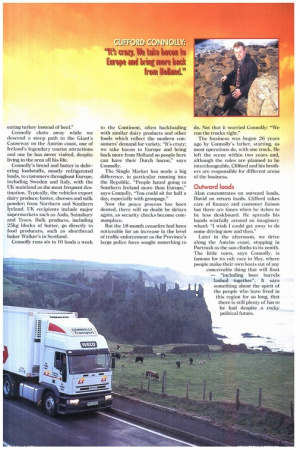
Page 42
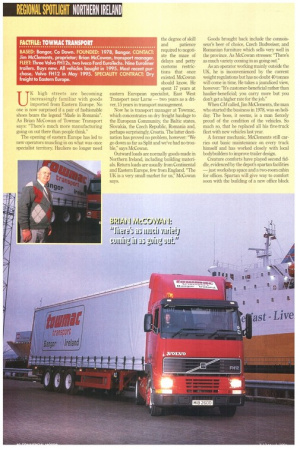
Page 43
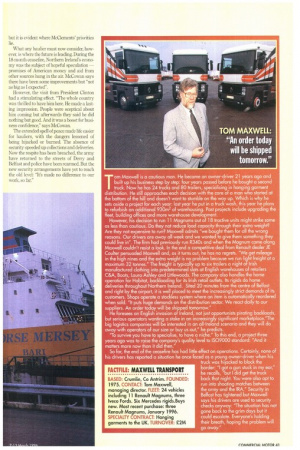
Page 44

Page 45
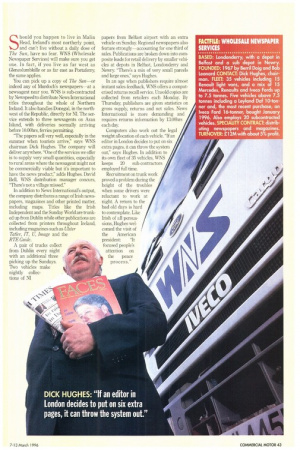
Page 46
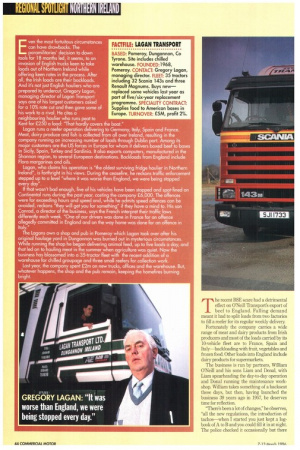
Page 47
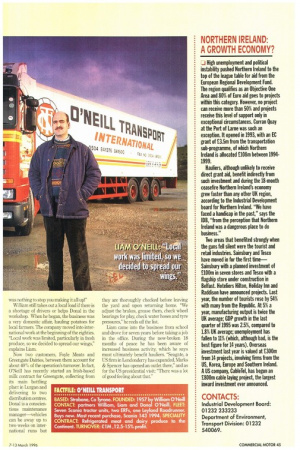
If you've noticed an error in this article please click here to report it so we can fix it.
Hanging on to hope
Northern Ireland faces troubled times as the politicians strive to repair the shattered peace process. However, progress made during the 18-month ceasefire included the return of tourists and a growth in business confidence, so the advances made should not be overlooked. Sainsbury and Tesco are opening stores for the first time, hotel chains are investing, manufacturing output is twice the UK average and GDP growth in the last quarter of 1995 was 2.5%, compared to 1.8% elsewhere in the UK. Did hauliers benefit when the guns fells silent or are they fearful of a return to the bad old days when trucks were stolen to blockade the border and drivers were reluctant to work at night?
Patric Cunnane crossed the Irish Sea to find out.
FACTFILE: CONNOLLY TRANSPORT BASED: Ballymoney, Antrim. Chill store carries 1,700 tonnes. FOUNDED: 1970. CONTACT: directors Clifford, Alan, and David Connolly. FLEET: 24 tractor units including 20 lveco Ford EuroTechs; Iwo Scanias, one Daf, one ERE. Buys new. Most recent purchase, two EuroTechs in January 1996. SPECIALITY CONTRACTS: Cheese slices to European outlets of McDonalds. Dairy products and other foodstuffs to supermarkets. TURNOVER: £3M plus.
Sit down to a cheeseburger in any one of hundreds of McDonalds on the Continent and the UK and you can be certain of one fact. The cheese slice melting in your bun has been on a truck belonging to Connolly Transport. The Ballymoney operator has the contract to supply thousands of cheese slices from a dairy producer in Coleraine to the central warehouses of McDonalds in France, Holland, Belgium and the UK.
No doubt this is an example of what McDonalds would call local sourcing. In any case, if Connolly's experience is anything to go by, the recent BSE scare has had little effect on Big Mac consumption.
"It went haywire before Christmas," says Clifford Connolly, one of three brothers running the 24-vehicle operation, "You would think they would be eating turkey instead of beef."
Connolly chats away while we descend a steep path to the Giant's Causeway on the Antrim coast, one of Ireland's legendary tourist attractions and one he has never visited, despite living in the area all his life.
Connolly's bread and butter is delivering foodstuffs, mostly refrigerated loads, to customers throughout Europe, including Sweden and Italy, with the UK mainland as the most frequent destination. Typically, the vehicles export dairy produce; butter, cheeses and milk powder; from Northern and Southern Ireland. UK recipients include major supermarkets such as Asda, Sainsbury and Tesco. Bulk products, including 25kg blocks of butter, go directly to food producers, such as shortbread baker Walker's in Scotland.
Connolly runs six to 10 loads a week to the Continent, often backloading with similar dairy products and other foods which reflect the modern consumers' demand for variety. "It's crazy; we take bacon to Europe and bring back more from Holland so people here can have their Dutch bacon," says Connolly.
The Single Market has made a big difference, in particular running into the Republic. "People hated going to Southern Ireland more than Europe," says Connolly, "You could sit for half a day, especially with groupage."
Now the peace process has been dented, there will no doubt be delays again, as security checks become commonplace.
But the 18-month ceasefire had been noticeable for an increase in the level of traffic enforcement as the Province's large police force sought something to do. Not that it worried Connolly: "We run the trucks right."
The business was begun 26 years ago by Connolly's father, starting, as most operations do, with one truck. He left the scene within two years and, although the roles are planned to be interchangeable, Clifford and his brothers are responsible for different areas of the business.
Outward loads
Alan concentrates on outward loads, David on return loads. Clifford takes care of finance and customer liaison but there are times when he itches to be less deskbound. He spreads his hands wistfully around an imaginary wheel: "I wish I could get away to do some driving now and then."
Later in the afternoon, we drive along the Antrim coast, stopping in Portrush as the sun climbs to its zenith. The little town, says Connolly, is famous for its raft race in May, where people make their own boats out of any conceivable thing that will float — "including beer barrels lashed together". It says something about the spirit of the people who have lived in this region for so long, that there is still plenty of fun to be had despite a rocky political future. FACTFILE: TOWMAC TRANSPORT
BASED: Bangor, Co Down. FOUNDED: 1978, Bangor. CONTACT: Jim McClements, proprietor; Brian McCowan, transport manager. FLEET: Three Volvo FH12s, two lveco Ford EuroTechs. Nine Euroliner trailers. Buys new. All vehicles bought in 1995. Most recent purchase, Volvo FH12 in May 1995. SPECIALITY CONTRACT: Dry freight to Eastern Europe.
UK high streets are becoming increasingly familiar with goods imported from Eastern Europe. No one is now surprised if a pair of fashionable shoes bears the legend "Made in Romania". As Brian McCowan of Towmac Transport says: "There's much more manufacturing going on out there than people think."
The opening of eastern Europe has led to new operators muscling in on what was once specialist territory. Hauliers no longer need the degree of skill and patience required to negotiate the maze of delays and petty customs restrictions that once existed. McCowan should know. He spent 17 years at eastern European specialist, East West Transport near Larne — two years as a driver, 15 years in transport management.
Now he is transport manager at Towmac, which concentrates on dry freight haulage to the European Community, the Baltic states, Slovakia, the Czech Republic, Romania and, perhaps surprisingly, Croatia. The latter destination has proved no problem, however: "We go down as far as Split and we've had no trouble," says McCowan.
Outward loads are normally goods made in Northern Ireland, including building materials. Return loads are usually from Continental and Eastern Europe, few from England. The UK is a very small market for us," McCowan says. Goods brought back include the connoisseur's beer of choice, Czech Budweiser, and Romanian furniture which sells very well in the province. As McCowan stresses: "There's as much variety coming in as going out."
As an operator working mainly outside the UK, he is inconvenienced by the current weight regulations but has no doubt 40 tonnes will come in time. He takes a jaundiced view, however: "It's customer-beneficial rather than haulier-beneficial; you carry more but you don't get a higher rate for the job."
When CM called, Jim McClements, the man who started the business in 1978, was on holiday. The boss, it seems, is a man fiercely proud of the condition of the vehicles. So much so, that he replaced all his five-truck fleet with new vehicles last year.
A former mechanic, McClements still carries out basic maintenance on every truck himself and has worked closely with local bodybuilders to improve trailer design.
Creature comforts have played second fiddle, evidenced by the depot's spartan facilities —just workshop space and a two-room cabin for offices. Spartan will give way to comfort soon with the building of a new office block but it is evident where 11/1cClements' priorities lie.
What any haulier must now consider, however. is where the future is leading. During the 18-month ceasefire, Northern Ireland's economy was the subject of hopeful speculation -promises of American money and aid from other sources hung in the air. McCowan says there have been some improvements but "not as big as I expected".
However, the visit from President Clinton had a stimulating effect. "The whole country was thrilled to have him here. He made a lasting impression. People were sceptical about him coming but afterwards they said he did nothing but good. And it was a boost for business confidence," says McCowan.
The extended spell of peace made life easier for hauliers, with the dangers lessened of being hijacked or burned. The absence of security speeded up collections and deliveries. Now the re.spite has been breached, the army have returned to the streets of Derry and Belfast and police have been rearmed. But the new security arrangements have yet to reach the old level: "It's made no difference to our work, so far."
Tam Maxwell is a cautious man. He became an owner-driver 21 years ago and built up his business step by step: four years passed before he bought a second truck. Now he has 24 trucks and 80 trailers, specialising in hanging garment distribution. He still approaches each decision with the care of a man who started at the bottom of the hill and doesn't want to stumble on the way up Which is why he sets aside a project for each year: last year he put in a truck wash, this year he plans to refurbish an additional 930m2 of warehousing. Past projects include upgrading the fleet, building offices and more warehouse development. However, his decision to run 11 Magnums out of 18 tractive units might strike some as less than cautious. Do they not reduce load capacity through their extra weight? Are they not expensive to run? Maxwell admits "we bought them for all the wrong reasons. Our drivers are away all week and we wanted to give them something they could live in". The firm had previously run R340s and when the Magnum came along Maxwell couldn't resist a look. In the end a competitive deal from Renault dealer JE Coulter persuaded Maxwell and, as it turns out, he has no regrets, 'We get mileage in the high nines and the extra weight is no problem because we run light freight at a maximum 32 tonnes." The freight is typically up to six trailers a night of Irish manufactured clothing into predetermined slots at English warehouses of retailers C&A, Boots, Laura Ashley and Liitlewoods. The company also handles the home operation for Habitat, backloading for its Irish retail outlets. Its rigids do home deliveries throughout Northern Ireland. Sited 20 minutes from the centre of Belfast and right by the airport, it is well placed to meet the increasingly strict demands of its customers. Shops operate a stockless system where an item is automatically reordered when sold. "It puts huge demands on the distribution sector. We react daily to our suppliers An order today will be shipped tomorrow."
He foresees an English invasion of Ireland, not just opportunists pirating backloads, but serious operators wanting a stake in an increasingly significant marketplace."The big logistics companies will be interested in an all-Ireland scenario and they will do away with operators of our size or buy us out,' he predicts. "To survive you have to specialise, to have a niche." To this end, a project three years ago was to raise the company's quality level to 1509000 standard: "And it matters more now than it did then."
So far, the end of the ceasefire has had little effect on operations. Certainly, none of his drivers has reported a situation he once faced as a young owner-driver when his truck was hijacked to block the border: "I got a gun stuck in my ear," he recalls, "but I did get the truck back that night. You were also apt to run into shooting matches between the army and the IRA." Security in Belfast has tightened but Maxwell says his drivers are used to security checks anyway: "The situation has not gone back to the grim days but it could escalate. Everyone's holding their breath, hoping the problem will go away."
FACTFILE: MAXWELL TRANSPORT BASED: Crumlin, Co Antrim. FOUNDED: 1975. CONTACT: Tom Maxwell, managing director. FLEET: 24 vehicles including 11 Renault Magnums, three lveco Fords, Six Mercedes rigids.Buys new. Most recent purchase: three Renault Magnums, January 1996. SPECIALTY CONTRACT: Hanging garments to the UK. TURNOVER: E2M FACTFILE: BUSHMILLS BASED: Bushmills, County Antrim. Owned by Irish Distillers Group, a subsidiary of Pernod Ricard. FOUNDED: 1608, with origins dating to 1276, claims to be the world's oldest distillery. CONTACT: Michael Dalzell, transport and shipping manager. FLEET: Three units, comprising a Volvo FH12, and ERF and a Ford Cargo tipper. Subcontracts to Dillon Bass in Ireland and a Belfast haulier for England, Scotland and Wales. Most recent purchase, the FH12, in August 1995. SPECIALITY CONTRACT: Distiller of Bushmills Malt, Blackbush and Bushmills whiskeys. TURNOVER: £20M Back in 1975, Bushmills laid down 300 barrels of Millennium Whiskey, not to be bottled until the year 2000. Every barrel has been snapped up at .£4,500 a time, promising at least 300 memorable parties in the early months of the new century.
Some of the barrels are earmarked to go abroad, to individuals or to companies. Others have sold locally, a few to groups of army officers who plan a helluva reunion bash in four or five years. Bushmills will bottle the whiskey and customers can choose a customised label for their bottles That's very civilised compared to the earliest evidence of distilling on the site when, in 1276, Sir Robert Savage, Ground Landlord of Bushmills, fortified his troops before battle with "Uisce Beatha", the water of life, whiskey's gaelic name.
The present distillery dates from 1608, sourcing its own water from St Column's Rill, a tributary of the River Bush, and was rebuilt after a fire in 1885.
Celebrity fans of the popular tipple include actors Tom Hanks, Paul Newman and Burt Reynolds, last seen sharing a bottle at the Oscars. A quarter of production is consumed in Northern Ireland, with a further 25% exported to the US, 10% to Southern Ireland, 8% to the UK mainland and the balance elsewhere, including Continental Europe.
The product received unfavourable US publicity after allegations that the distillery discriminates against Catholics. The allegations are flatly denied by Bushmills which admits
there are more Protestant workers but says that is because the town is predominately Protestant: "That's just the way things are in Ireland. In some areas, people grow up as Protestants, in others Catholic, but the allegations are a pity because they add more fuel to the fire," says Michael Dalzell, transport and shipping manager.
Ironically, Bushmills is owned by Irish Distillers which in turn owns the Southern brands Jameson, Paddy and Power and is itself a subsidiary of French group Pernod Ricard, which took over Irish Distillers in 1989.
For good measure, from 1947 to 1964 the distillery was owned by British mail order specialist Great Universal Stores before a period of acquisition by Canadian liquor company, Seagram. In 1976, Seagram sold the Old Bushmills Distillery to Irish Distillers Group returning the product to Irish ownership until Pernod Ricard stepped in The road transport operation run from the distillery delivers bottled product to Belfast for shipment abroad.
Backloads include old bourbon barrels imported from America and old sherry barrels from Spain which lend flavour and colour to two of the products, Bushmills and Blackbush whiskies "A brand new barrel makes the whiskey taste too wooden," explains Dalzell.
The intermodal nature of the operation means that Bushmills can plate a vehicle at 44 tonnes for shipping out a 13m triaxle trailer from Belfast to Milan by sea and rail. The Belfast run keeps two vehicles busy, a Volvo FH12 and an ERF tractor, with two runs each, five days a week on the four-hour round trip.
Other backloads include ISO containers of grain whiskey picked up from the railhead and sent up from sister company, Midleton Distillery in Cork. The whiskey is required because the Bushmills site produces only malt whiskey and grain whiskey is needed to blend into the Bushmills and Blackbush brands.
More recently Bushmills has begun bottling Southern brand, Jameson, on its Antrim production line. The operation from the south used to be road going but the threat of hi-jacking convinced the company that rail containerisation was less risky. Transport foreman, Billy Chambers, was hi-jacked 22 years ago near Ballymena: "Someone just drove up with a sawn-off shotgun," he recalls with a shrug.
A third local vehicle, a Ford Cargo tipper, distributes wet grains—malted barley left over from the early stages of production—to farmers for animal feed. Distribution to retail outlets in the province is carried out by specialist drinks distributor, Dillon Bass Other UK distribution is carried out by a Belfast operator regularly running trailers into England.
Bushmills hauls its own goods so it does not require an 0-licence, but this can lead to grey areas. Sent to pick up two stills from Scotland, Billy Chambers was once stopped in a roadside check and "had some explaining to do".
At home, Dalzell says there has been a gradual increase in security checks since the IRA abandoned its ceasefire. "But it has not affected our day-to-day working," he says.
Last year, the ceasefire led to a large increase in visitors to the distillery, with the largest increase coming from the Republic. Finally, with the lovely malty smells that hang in the air around Bushmills' distinctive Pagoda towers, there is one more question to ask Dalzell: do you drink the stuff yourself? He bursts out laughing: "Oh, the odd bottle every night!" Billy Chambers sums it up: "Does a cat like milk?"
FACTFILE: WHOLESALE NEWSPAPER SERVICES BASED: Londonderry, with a depot in Belfast and a sub depot in Newry. FOUNDED: 1967 by Berril Doig and Bob Leonard CONTACT: Dick Hughes,. chairman. FLEET 35 vehicles including 15 Renault light vans, and a mix of 15 Mercedes, Renaults and Iveco Fords up to 7.5 tonnes. Five vehicles above 7.5 tonnes including a Leyland Daf 10-tonner and, the most recent purchase, an Iveco Ford 16-tanner, bought January 1996. Also employs 20 subcontracted vehicles. SPECIALITY CONTRACT: distributing newspapers and magazines. TURNOVER: £12M with about 5% profit. Should you happen to live in Malin Head, Ireland's most northerly point, and can't live without a daily dose of The Sun, have no fear. WNS (Wholesale Newspaper Services) will make sure you get one. In fact, if you live as far west as Glencolumbkille or as far east as Portaferry, the same applies.
You can pick up a copy of The Sun—or indeed any of Murdoch's newspapers at a newsagent near you. WNS is sub-contracted by Newspeed to distribute News International titles throughout the whole of Northern Ireland. It also handles Donegal, in the north. west of the Republic, directly for NI. The service extends to three newsagents on Aran Island, with deliveries normally arriving before 10.00hrs, ferries permitting.
"The papers sell very well, especially in the summer when tourists arrive," says WNS chairman Dick Hughes. The company will deliver anywhere. "One of the services we offer is to supply very small quantities, especially to rural areas where the newsagent might not be commercially viable but it's important to have the news product," adds Hughes. David Bell, WNS distribution manager concurs, "There's not a village missed."
In addition to News International's output, the company distributes a range of Irish newspapers, magazines and other printed matter, including maps. Titles like the Irish Independent and the Sunday World are trunked up from Dublin while other publications are collected from printers throughout Ireland, including magazines such as Ulster Tatter, IT, U, Image and the RTE Guide.
A pair of trucks collect from Dublin every night with an additional three , picking up the Sundays. Two vehicles make nightly collec tions of NI
papers from Belfast airport with an extra vehicle on Sunday. Regional newspapers also feature strongly—accounting for one third of sales. Publications are broken down into composite loads for retail delivery by smaller vehicles at depots in Belfast, Londonderry and Newry. "There's a mix of very small parcels and large ones," says Hughes.
In an age when publishers require almost instant sales feedback, WNS offers a computerised returns recall service. Unsold copies are collected from retailers each Monday. By Thursday, publishers are given statistics on gross supply, returns and net sales. News International is more demanding and requires returns information by 13,00hrs each day.
Computers also work out the legal weight allocation of each vehicle. "If an editor in London decides to put on six extra pages, it can throw the system out," says Hughes. In addition to its own fleet of 35 vehicles, WNS keeps 20 sub-contractors employed full time.
Recruitment on trunk work proved a problem during the height of the troubles when some drivers were reluctant to work at night. A return to the bad old days is hard to contemplate. Like Irish of all persuasions, Hughes welcomed the visit of ,
the American president: "It focused people's attention on the peace process."
Even the most fortuitous circumstances can have drawbacks. The paramilitaries' decision to down tools for 18 months led, it seems, to an invasion of English trucks keen to take loads out of Northern Ireland while offering keen rates in the process. After all, the Irish loads are their backloads. And it's not just English hauliers who are prepared to undercut. Gregory Logan, managing director of Logan Transport says one of his largest customers asked for a 10% rate cut and then gave some of his work to a rival. He cites a neighbouring haulier who runs peat toKent for £250 a load: "That hardly covers the boat."
Lagan runs a reefer operation delivering to Germany, Italy, Spain and France. Meat, dairy produce and fish is collected from all over Ireland, resulting in the company running an increasing number of loads through Dublin port. Among its major customers are the US forces in Europe for whom it delivers boxed beef to bases in Sicily, Spain, Turkey and Sardinia. It also exports computers, manufactured in the Shannon region, to several European destinations. Backloads from England include Flora margarines and oils.
Lagan, who claims his operation is "the oldest surviving fridge haulier in Northern Ireland", is forthright in his views. During the ceasefire, he reckons traffic enforcement stepped up to a level "where it was worse than England, we were being stopped every day". If that wasn't bad enough, five of his vehicles have been stopped and spot-fined on Continental runs during the past year, costing the company £6,000. The offences were for exceeding hours and speed and, while he admits speed offences can be avoided, reckons "they will get you for something" if they have a mind to. His son Conrad, a director of the business, says the French interpret their traffic laws differently each week. "One of our drivers was done in France for an offence allegedly committed in England and on the way home was done for an offence in Italy." The Lagans own a shop and pub in Pomeroy which Logan took over after his original haulage yard in Dungannon was burned out in mysterious circumstances. While running the shop he began delivering animal feed, up to Five loads a day, and that led on to hauling meat in the summer when agriculture was quiet. Now the business has blossomed into a 35-tractor fleet with the recent addition of a warehouse for chilled groupage and three small reefers For collection work. Last year, the company spent £2m on new trucks, offices and the warehouse. But, whatever happens, the shop and the pub remain, keeping the homehres burning bright.
FACTFILE: LIMN TRANSPORT BASED: Pomeroy, Dungannon, Co Tyrone. Site includes chilled warehouse. FOUNDED:1968, Pomeroy. CONTACT: Gregory Logan, managing director. FLEET: 35 tractors including 32 Scania 143s and three Renault Magnums. Buys new— replaced some vehicles last year as part of five/six-year replacement programme. SPECIALITY CONTRACT: Supplies food to American bases in Europe. TURNOVER: E5M, profit 2%.
FACTFILE: O'NEILL TRANSPORT BASED: Strabane, Co Tyrone. FOUNDED: 1957 by William O'Neill CONTACT: partners William, Liam and Donal O'Neill. FLEET: Seven Sconia tractor units, two ERFs, one Leyland Roadrunner. Buys new. Most recent purchase, Scania 143 1994. SPECIAUlY CONTRACT: Refrigerated meat and dairy produce to the Continent. TURNOVER: £1M ,12.5-15% profit. The recent BSE scare had a detrimental effect on O'Neill Transport's export of beef to England. Falling demand meant it had to split loads from two factories to fill a reefer for its regular weekly delivery.
Fortunately the company carries a wide range of meat and dairy products from Irish producers and most of the loads carried by its 10-vehicle fleet are to France, Spain and Italy—backloading with fruit, vegetables and frozen food. Other loads into England include dairy products for supermarkets.
The business is run by partners, William O'Neill and his sons Liam and Donal, with Liam spearheading the day-to-day operation and Donal running the maintenance workshop. William takes something of a backseat these days, but then, having launched the business 39 years ago in 1957, he deserves time for reflection.
"There's been a lot of changes," he observes, "all the new regulations, the introduction of tachos—when I started you just kept a logbook of A to B and you could fill it in at night. The police checked it occasionally but there
was nothing to stop you making it all up!"
William still takes out a local load if there is a shortage of drivers or helps Donal in the workshop. When he began, the business was a very domestic affair, hauling potatoes for local farmers. The company moved into international work at the beginning of the eighties. "Local work was limited, particularly in fresh produce, so we decided to spread our wings," explains Liam.
they are thoroughly checked before leaving the yard and upon returning home. "We adjust the brakes, grease them, check wheel bearings for play, check water hoses and tyre pressures," he reels off the list.
Liam came into the business from school and drove for seven years before taking a job in the office. During the now-broken 18 months of peace he has been aware of increased business activity, which he says must ultimately benefit hauliers. "Seagate, a US firm in Londonderry has expanded, Marks & Spencer has opened an outlet there," and as for the US presidential visit: "There was a lot of good feeling about that."
NORTHERN IRELAND: A GROWTH ECONOMY?
-J High unemployment and political instability pushed Northern Ireland to the top of the league table for aid from the European Regional Development Fund. The region qualifies as an Objective One Area and 80% of Euro aid goes to projects within this category. However, no project can receive more than 50% and projects receive this level of support only in exceptional circumstances. Curran Quay at the Port of Larne was such an exception. It opened in 1993, with an EC grant of £3.5m from the transportation sub-programme, of which Northern Ireland is allocated £108m between 19941999.
Hauliers, although unlikely to receive direct grant aid, benefit indirectly from such investment and during the 18-month ceasefire Northern Ireland's economy grew faster than any other UK region, according to the Industrial Development board for Northern Ireland. "We have faced a handicap in the past," says the IDB, "from the perception that Northern Ireland was a dangerous place to do business."
Two areas that benefited strongly when the guns fell silent were the tourist and retail industries. Sainsbury and Tesco have moved in for the first time— Sainsbury with a planned investment of £100m in seven stores and Tesco with a flagship store under construction in Belfast. Hoteliers Hilton, Holiday Inn and Raddison have announced projects. Last year, the number of tourists rose by 54% with many from the Republic. At 5% a year, manufacturing output is twice the UK average; GDP growth in the last quarter of 1995 was 2.5%, compared to 1.8% UK average; unemployment has fallen to ll% (which, although bad, is the best figure for 14 years). Overseas investment last year is valued at t300m from 14 projects, involving firms from the US, Korea, Europe and Southern Ireland. A US company, CableTel, has begun an £800m cable laying project, the largest inward investment ever announced.
CONTACTS:
Industrial Development Board: 01232 233233
Department of Environment, Transport Division: 01232 540069.
















































































































